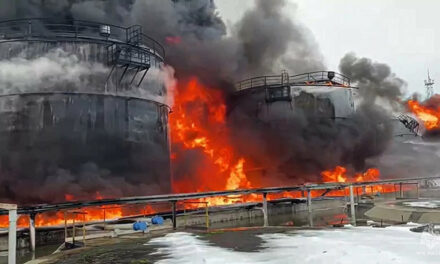Yuri Bilinsky, New Pathway – Ukrainian News.
The National Energy Board’s (NEB) decision to recommend the Trans Mountain Pipeline expansion for approval, announced on February 22, has been met with opposing sentiment from different parts of the energy sector debate.
Tzeporah Berman, International Program Director at an environmental advocacy organization Stand.earth, criticized the decision and said that “The Trans Mountain Pipeline is not in the public interest.”
Meanwhile, Shannon Stubbs, the Conservative Shadow Minister for Natural Resources, in his statement called the decision “positive”.
The parties also disagreed regarding the government’s involvement in furthering of the pipeline’s expansion.
The Stand.earth’s statement called NEB recommendation to approve Trans Mountain Pipeline “the direct result of Prime Minister’s Office influence.”
At the same time, Stubbs accused the Liberals of picking “the lengthiest, costliest, and most uncertain option” to move the project forward by directing the NEB to undertake a 22-week reconsideration.
The opposition to the pipeline cites the dangers to the safety of the marine environment and the project’s climate impacts. Stand.earth said that there is a lack of scientific understanding about what happens during a spill of diluted bitumen (dilbit) in a saltwater marine environment, and whether a spill of this “heavy, sinking oil” could adequately be cleaned up.
Diluted bitumen’s reaction to water is still debated.
Some believe dilbit sinks under water in hours and thus cannot be cleaned up.
Others believe that it might float for up to three weeks and thus could be recovered by skimming devices (Barry Gerding, columbiavalleypioneer.com).
In his article in the National Post in March 2018, Tristin Hopper noted that researchers seem to agree that it’s necessary to clean up a dilbit spill much faster than a conventional spill.
The Trans Mountain Corporation’s web-site says that the company has been moving oil through the Trans Mountain Pipeline and loading tankers at its marine terminal for almost 65 years, without a single spill from tanker operations.
In his article, Tristin Hopper estimated that while the Trans Mountain expansion would increase the tanker traffic in the waters off Vancouver, B.C. more than fivefold to above 30 per month, it’s reasonable to expect a marine spill would not happen.
In its Conditions and Recommendations for the Trans Mountain Expansion, NEB listed a number of measures that the project needs to plan in the near future related to marine spill prevention and response, and marine mammal protection.
The proponents of the project cite the need to develop the Canadian natural resource sector which still plays an important role in the country’s economy.
In the recent Macdonald-Laurier Institute commentary, long-time Globe and Mail columnist Jeffrey Simpson noted that fossil fuels will remain in demand “for a very long time” and called Canada’s struggles to build pipelines “bad news for employment, government revenues, economic growth and the Canadian dollar.”
Simpson provided the reasons why the review process for energy projects in Canada often gets delayed: “First Nations with legitimate impact claims are often not clearly understood by all parties; the proper representatives for First Nations communities are often unclear; Canada’s courts seem to muddy the waters even more, unable to provide consistent answers regarding precedent in these cases; government often adds hoops to jump through or new layers of review for projects.”
To speed up the consultation and negotiation process, Simpson proposed that governments avoid “trying to please all parties completely.” He believes that while governments’ project review system needs to be fair for First Nations and other stakeholders, they also should be timely and predictable for project proponents. Simpson said that, instead, “In Canada we have added to these necessary conditions, excessive litigiousness, Indigenous legal claims, widespread definitional confusions, regulatory uncertainty and political controversy.”
Canadian Association of Petroleum Producers (CAPP), whose members produce about 80% of Canada’s oil and natural gas, said this in its response to NP-UN’s question about the outlook for the Trans Mountain Pipeline project’s environmental review: “Industry supports a regulatory process that eliminates duplication and unnecessary regulatory burden while ensuring high standards for health, safety and the environment.”
Many parties have voiced concerns over the effects that the government’s pipeline-related decisions are having on the economy.
In the MLI commentary, Jeffrey Simpson noted that, in this environment, investing in Canada’s energy sector will remain stifled.
According to CAPP, capital investment in the Canadian oil and natural gas sector dropped from $81 billion in 2014 to about $41 billion in 2018, while the country has been losing $80 million a day due to a lack of pipeline capacity and the deeply discounted price on Canadian oil causing Alberta to curtail production.
MP Shannon Stubbs said that more than 100,000 jobs in the energy sector have already been lost and thousands more are now at risk.
In turn, Yves Giroux, the parliamentary budget officer, said that if the Trans Mountain pipeline expansion does not go ahead as planned and on budget, the $4.4 billion that government paid to buy the project will have been too high a price.
The Trans Mountain expansion project has been in limbo for a long time now and there seems to be lingering pessimism about its future in the different camps.
In her statement, Tzeporah Berman (Stand.earth) said that the Trans Mountain will never be built. She said that if federal cabinet now decides to approve the pipeline, it will have to fight with First Nations in the courts and with protesters in the streets.
MP Shannon Stubbs noted that the NEB’s recommendation to approve the Trans Mountain expansion does not lead the project closer to the construction phase and just puts the decision “back in the hands of the same Liberal cabinet that failed to start construction in the first place.” Along with Berman, Stubbs believes that the opponents of the project will launch the next wave of legal challenges.
Share on Social Media





































